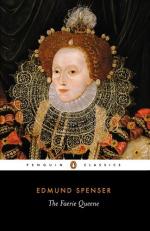XII
The doubtfull Damzell dare not yet commit
100
Her single person to their barbarous truth;[*]
But still twixt feare and hope amazd does
sit,
Late learnd[*] what harme to hasty trust
ensu’th:
They in compassion of her tender youth,
And wonder of her beautie soveraine,
105
Are wonne with pitty and unwonted ruth,
And all prostrate upon the lowly plaine,
Do kisse her feete, and fawne on her with count’nance
faine.
XIII
Their harts she ghesseth by their humble guise,
And yieldes her to extremitie of time;
110
So from the ground she fearlesse doth
arise,
And walketh forth without suspect of crime:[*]
They all as glad, as birdes of joyous
Prime,
Thence lead her forth, about her dauncing
round,
Shouting, and singing all a shepheards
ryme, 115
And with greene braunches strowing all
the ground,
Do worship her, as Queene, with olive[*] girlond cround.
XIV
And all the way their merry pipes they sound,
That all the woods with doubled Eccho
ring,
And with their horned feet[*] do weare
the ground, 120
Leaping like wanton kids in pleasant Spring.
So towards old Sylvanus they her bring;
Who with the noyse awaked commeth out
To weet the cause, his weake steps governing,
And aged limbs on Cypresse stadle stout;
125
And with an yvie twyne his wast is girt about.
XV
Far off he wonders, what them makes so glad,
Or Bacchus merry fruit[*] they did invent,
Or Cybeles franticke rites[*] have made
them mad,
They drawing nigh, unto their God present
130
That flowre of faith and beautie excellent.
The God himselfe, vewing that mirrhour
rare,[*]
Stood long amazd, and burnt in his intent;
His owne faire Dryope[*] now he thinkes
not faire,
And Pholoe fowle when her to this he doth compaire.
135
XVI
The woodborne people fall before her flat,
And worship her as Goddesse of the wood;
And old Sylvanus selfe bethinkes not,
what
To thinke of wight so faire, but gazing
stood,
In doubt to deeme her borne of earthly
brood; 140
Sometimes Dame Venus selfe he seemes to
see,
But Venus never had so sober mood;
Sometimes Diana he her takes to bee,
But misseth bow, and shaftes, and buskins to her knee.
XVII
By vew of her he ginneth to revive
145
His ancient love, and dearest Cyparisse,[*]
And calles to mind his pourtraiture alive,
How faire he was, and yet not faire to
this,[*]
And how he slew with glauncing dart amisse
A gentle Hynd, the which the lovely boy
150
Did love as life, above all worldly blisse;
For griefe whereof the lad n’ould
after joy,[*]
But pynd away in anguish and selfe-wild annoy.[*]




